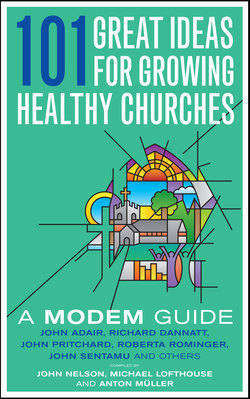Читать книгу 101 Great Ideas for Growing Healthy Churches - John Nelson - Страница 21
На сайте Литреса книга снята с продажи.
ОглавлениеGreat Idea 11: Be Friendly with Science and Medicine
DAVID TAYLOR
You created my inmost being, you knit me together in my mother’s womb. I praise you because I am fearfully and wonderfully made; your works are wonderful,
I know that full well
Psalm 139.13–14
Top Tip: Science should be regarded as a way of trying to come to terms with the world around us.
Business Perspective: Successful commercial organizations understand that customers live in many different worlds. Their product range takes account of the different experiences and needs generated by these worlds. No successful business would deny the existence of another world but would attempt to engage with it in order to increase profitability.
There are practical and theological reasons why we should be friendly with science and medicine. On a practical level we need to embrace science and medicine because they are part of the world in which we live. This is also the theological reason!
It is easy to see science as a threat, and faith as an irrational response to a rational world. In practice science is simply a way of explaining the rational. Most scientists would probably qualify that by saying that science is a way of trying to measure and understand things, as best we can, given what we already know. Very few scientific facts can be relied on as being absolute truths, but most will be reasonably good approximations to reality. So science should simply be regarded as a way of trying to come to terms with the world around us.
There is a tendency to try to polarize the arguments, by stating that science and faith do different things, and on the one hand that is self-evidently true. However, it is a mistake to think that neither has anything to say to the other.
Science can give us a much greater and detailed picture of the wonders of creation, and faith can respond to that with awe and delight. Faith, in turn, can show that some of the wonders cannot be measured in metres or kilograms but that the human response is actually part of the understanding.
The full picture only comes into focus when the two perspectives are aligned. We know so much about the creation of the cosmos which is exciting, as is the fact that there is so much more to learn about it. Without an understanding of the human place in the cosmos we would miss the full picture and risk damaging it irrevocably.
Christian understanding of the place of humans in the cosmos is shaped by what we find in scripture and through faith in Jesus.
There is a second reason why we should befriend science and medicine. That is because, as science and technology advance, we need to be able to help people think through the implications of the possible. This could be by asking challenging and thought-provoking questions regarding ethics, or by pointing out the possibility of unintended consequences. Of course, people of other faiths or none can and do raise ethical questions and point out moral dilemmas, but we have undeniable insights into what it means to be a person.
We can offer a really valuable service to a scientist or a clinician if we can sit and actually listen to the things that concern them. It often helps to have some understanding of the underlying science, because then the conversation is more informed. But it is also good if we just provide a listening ear for those with a burden and allow them to talk themselves through a problem.
In a perfect world, the relationship between science, medicine and the Christian faith would be a conversation, each informing the other, bringing fresh perspectives and shaping each others’ values and understanding.
That can only happen if we befriend science and medicine.
For reflection and discussion
1 How do you take time to celebrate the gifts we have been given through scientific and medical progress?
2 How do you keep yourself informed about scientific, medical and technological advancements?
3 What are the ethical and moral dilemmas raised by scientific, medical and technological advancements?
4 How will you encourage your congregation to engage these dilemmas?
